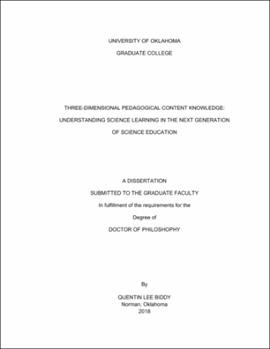| dc.description.abstract | This study focused on examining the pedagogical content knowledge (PCK) of teachers focused on transitioning to phenomena-driven, three-dimensional Learning as outlined in A Framework for K-12 Science Education (NRC, 2012) and the Next Generation Science Standards (NGSS Lead States, 2013). This study utilized a mixed methods explanatory sequential design (Creswell, 2013; Creswell & Clark, 2018) to develop and carry out this two-phased study. Phase One included quantitative data collection and analysis and Phase Two included qualitative data collection and analysis. At the national level, 19 states have adopted the NGSS (National Science Teachers Association, 2018). A number of other states have utilized the NGSS and A Framework for K-12 Science Education to develop three-dimensional standards similar to the NGSS (National Association of State Boards of Education, 2018). This study takes place in a state transitioning to three-dimensional standards similar to the NGSS.
PCK, an idea first formed by Lee S. Shulman (1986), is the ability of a teacher to take specific content knowledge about their discipline and craft it into meaningful and powerful learning opportunities for students (Kind, 2009). PCK is the “tacit, hidden knowledge” (Kind, 2009, p. 3) of a teacher that lies at the crossover between teacher content knowledge, teacher pedagogical knowledge and teacher contextual knowledge. The National Research Council (1996) identified PCK as “the knowledge that differentiates a scientist from a science teacher” (in Demird.ğen, 2016, p. 496).
Through a mathematics and science partnership (MSP) grant program focused on improving teacher content knowledge, pedagogical knowledge, and pedagogical content knowledge centered on 3D Learning and Teaching, 67 grades 3 through high school biology teachers from 18 rural school districts worked to transition to phenomena-driven three-dimensional instruction. Teachers needed to develop PCK that is specific to 3D Learning and Teaching or what could be described as Three-dimensional Pedagogical Content Knowledge (3D-PCK). Teachers need to understand the three dimensions, SEPs, CCCs, and DCIs, of the NGSS (NGSS Lead States, 2013), and they will also need to understand how to integrate the three-dimensions seamlessly in instruction so students are actively utilizing all three dimensions to make meaning and construct explanations for natural phenomena (Allen & Penuel, 2015; Bybee, 2013; Moulding et al., 2015; NASEM, 2015; Reiser, 2013). This new form of PCK would look different from PCK found in traditional science classrooms and would have characteristics directly related to 3D Learning and Teaching.
Findings show that the teachers involved in the study were able to increase their understanding and implementation of 3D Learning. Additionally, 3D-PCK was a useful construct for uncovering and describing areas of teacher growth related to 3D Learning. Through this study the evidences of growth in understanding and implementation of 3D Learning, the growth structures supporting this growth, and the motivations driving this growth in the participating teachers was identified. | en_US |
